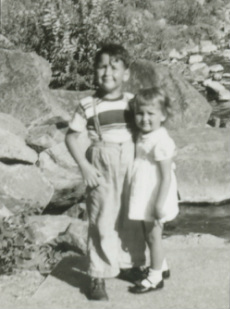
Just like Gallagher, the uncertainty of that early life lead to exploration. I spent much of my childhood searching for meaning. And I discovered, like many others, that writing can change circumstances and give new meaning to experiences. Writing extends lives--both your own and the ones only present in your memory. Through the process of writing, you can make a new home for yourself. The territory where a writer feels the most contradictory emotions are the ripest for exploration. Writing is proof of an examined existence.
In the above photo, my brother and I are standing on the rocky banks of Brandywine Creek, near New Castle, Delaware. It is my first memory. My father was on a week-end pass from the Veteran's hospital where he'd spent most of my early years recovering from a grenade that exploded in his hand during WWII. I remember noticing his missing fingers for the first time that day and making a decision not to ask about them.
Years later, in sixth grade when I was assigned a paragraph about an important decision I'd made, I chose that day. The details were still inside me. The rocks. The sound of the water cascading over them. My brother's protective hand on my back. The picnic lunch my mother had prepared. And the look in my father's eyes when he saw me staring at his crippled hand. The look on his face was what we writers call subtext and I understood it, even as a very young child. I was curious, but also cautious--sensitive, even then, to his moods and feelings.
So there you have it, that vulnerable territory where emotions are contradictory. As writers, we need to free our spirits, dig those contradictions out and hold them accountable to the naked light.

 RSS Feed
RSS Feed